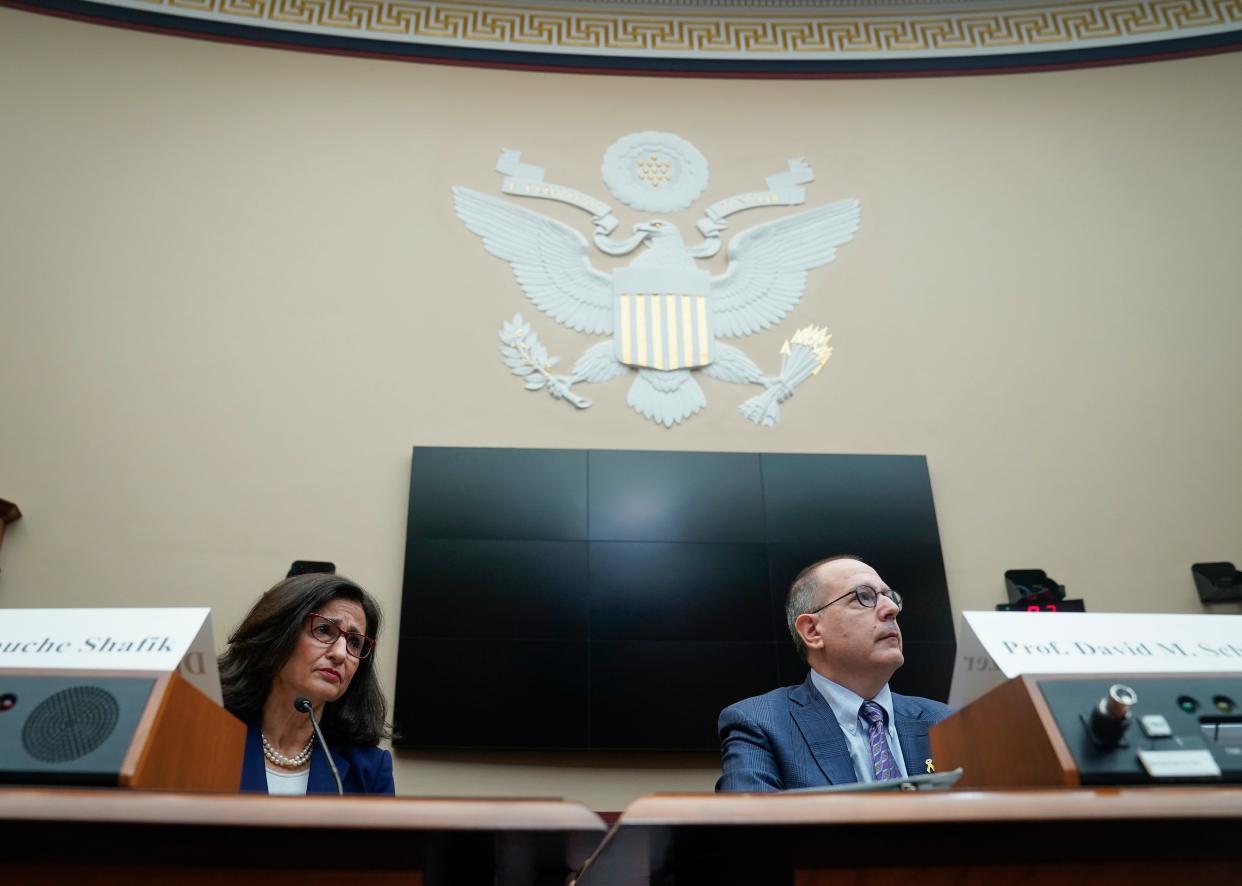The Antisemitism Awareness Act: What to know

By 320-91 vote, the U.S. House on May 1 passed the Antisemitism Awareness Act.
The bill came to a vote amid pro-Palestinian protests on college campuses against the Israel-Hamas war that some Jewish students said they found threatening. It produced an unusual lineup of supporters and detractors.
Although the legislation passed easily and with bipartisan support, the votes against it were also bipartisan: 21 Republicans and 70 Democrats voted no. Some Republicans who voted no cited possible threats to Christian beliefs; some Democrats said the measure would chill political speech critical of Israel’s government, rather than Jews as a group.
Here are some questions and answers about the legislation:
What does the bill say?
The bill requires the federal Education Department to use the definition of antisemitism outlined by the Stockholm-based International Holocaust Remembrance Alliance when addressing allegations of discrimination in higher education. If discrimination is determined to have occurred, schools would be at risk of losing federal funding. Currently, there is no standard definition for antisemitism in such discrimination cases.
Portions of the alliance’s definition of antisemitism are not especially controversial, including "calling for, aiding, or justifying the killing or harming of Jews," "making mendacious, dehumanizing, demonizing, or stereotypical allegations about Jews," or denying the Holocaust.
Rep. Mike Lawler, R-N.Y., a leading sponsor of the bill, said the recent campus protests made passing the measure urgent.
In a statement after passage, Lawler said the bill "is a key step in calling out antisemitism where it is and ensuring antisemitic hate crimes on college campuses are properly investigated and prosecuted."
He added, "When people engage in harassment or bullying of Jewish individuals where they justify the killing of Jews or use blood libel or hold Jews collectively responsible for the actions of the Israeli government — that is antisemitic. It’s unfortunate that needs to be clarified, but that's why this bill is necessary."
But the bill’s critics said parts of the definition could bleed into more legitimate criticism of Israel’s government.
Those portions include "denying the Jewish people their right to self-determination, e.g., by claiming that the existence of a State of Israel is a racist endeavor," "applying double standards by requiring of (Israel) a behavior not expected or demanded of any other democratic nation," and "drawing comparisons of contemporary Israeli policy to that of the Nazis."
What do critics of the bill say about political speech and Israel?
In recommending a no vote, the American Civil Liberties Union wrote that the bill is "not needed to protect against antisemitic discrimination; instead, it would likely chill free speech of students on college campuses by incorrectly equating criticism of the Israeli government with antisemitism."
This view won backing from some figures from across the ideological spectrum.
Rep. Jerry Nadler, D-N.Y., told a congressional hearing that "speech that is critical of Israel alone does not constitute unlawful discrimination."
Sen. Bernie Sanders, I-Vt., said it was wrong to say that "if you are protesting, or disagree with what (Israeli Prime Minister Benjamin) Netanyahu and his extremist government are doing in Gaza, you are an antisemite."
Rep. Sara Jacobs, D-Calif., said, "I’m deeply concerned about the rise of antisemitism in San Diego and across the country. But I do not believe that anti-Zionism is inherently antisemitism. … "I support Israel’s right to exist, but I also know many people who question whether Israel should exist as a Jewish state who are deeply connected to their Judaism."
Nadler, Sanders and Jacobs are all Jewish.
Some legal scholars echoed the criticisms.
Eugene Volokh, a UCLA law professor who leans libertarian, wrote that the bill "really does risk suppressing not just discriminatory conduct but speech — speech that I generally disagree with, but speech that is fully constitutionally protected."
Florida International University law professor Howard M. Wasserman concurred.
Wasserman told PolitiFact that "the law raises genuine First Amendment concerns to the extent it can or will be used to impose or threaten (Civil Rights Act) Title VI liability on schools for failing to restrict antisemitic but otherwise constitutionally protected speech."
Meanwhile, Kenneth Stern, an attorney who helped write the definition in question, has expressed caution about relying on it for the purpose the bill intends. In 2016, when Congress was considering an earlier version of the bill, Stern testified that the definition was designed to help governments collect antisemitism data and "was not drafted, and was never intended, as a tool to target or chill speech on a college campus."
Timothy Zick, a William & Mary Law School professor, said he’s skeptical that the definition would chill Christian beliefs or criticism of Israel. But he added that it "does not mean it is a good idea to adopt the definition, which was intended to be educational rather than legal."
What do the bill’s conservative critics say?
Some conservatives focused on whether the antisemitism definition could cover elements of the Bible.
Rep. Marjorie Taylor Greene, R-Ga., posted on X that the bill’s passage "could convict Christians of antisemitism for believing the Gospel that says Jesus was handed over to Herod to be crucified by the Jews."
When conservative commentator Charlie Kirk asked in an X post whether the bill made "parts of the Bible illegal," former Fox News host Tucker Carlson replied, "Yes. The New Testament."
The Anti-Defamation League considers blaming the Jews for killing Jesus a "myth" and said it "has been used to justify violence against Jews for centuries. Historians as well as Christian leaders have agreed that the claim is baseless." After centuries of teaching it, the Catholic Church rejected the belief in 1965, a stance then-Pope Benedict XVI reiterated in 2011.
Lawler dismissed the concerns of Greene and others, telling CNN they were "inflammatory and it's irrational."
"If you're calling all Jews Christ-killers, then yes, that is antisemitic and everybody understands that," Lawler said. "But if you're referring to the Bible in context, then no, nobody is saying that that is antisemitic."
Gregory P. Magarian, a law professor at Washington University in St. Louis, said he sees the concern over the Bible as a stretch.
"My best sense is that the Bible is sufficiently normatively ingrained in Western cultures, especially in the U.S., that no government actor would be at all likely to invoke the (International Holocaust Remembrance Alliance) definition against any common usage of the Bible," Magarian told PolitiFact.
Where does the bill stand?
The bill has moved to the Senate, where its fate is uncertain.
"There are objections on both sides," said Senate Majority Leader Chuck Schumer, D-N.Y.

How binding would the bill be?
It’s unclear how binding the bill would be. It is phrased as a "sense of Congress" legislation, which is language typically used for nonbinding, advisory legislation. However, it also says that the Department of Education "shall" take into consideration the definition of antisemitism, which seems to leave no wiggle room.
"I would call it ‘strongly advisory’ — a warning shot across the bow with possible funding cuts to follow if not heeded," said Donald Wolfensberger, a congressional procedure specialist with the Woodrow Wilson Center for Scholars.
"The bill could have directly amended the Civil Rights Act to cement this advisory language into law, but (lawmakers) didn’t dare to, given likely opposition by the Senate, the president and even the courts over First Amendment free speech violation concerns."
Ilya Somin, a George Mason University law professor, said the bill’s ultimate impact might be less sweeping than some of its critics suggest because then-President Donald Trump incorporated the definition into Title VI by executive order and Biden kept that policy in place.
Somin added that antisemitic discrimination "is already illegal under Title VI, under long-standing legal precedent. However, the bill does clarify and codify that, and ends any residual uncertainty," including whether being Jewish falls under the category of national origin, race or a religious group.
PolitiFact copy chief Matthew Crowley contributed to this report.
Our sources
Congress.gov, H.R. 6090: Antisemitism Awareness Act of 2023, accessed May 9, 2024
House roll call vote on H.R. 6090, May 1, 2024
International Holocaust Remembrance Alliance, "Working definition of antisemitism," accessed March 9, 2024
American Civil Liberties Union, "ACLU Urges House of Representatives to Oppose Anti-semitism Awareness Act," April 26, 2024
Anti-Defamation League, "Myth: Jews Killed Jesus," accessed May 9, 2024
Marjorie Taylor Greene, post on X, May 1, 2024
Tucker Carlson and Charlie Kirk, posts on X, May 2, 2024
New Yorker, "The Problem with Defining Antisemitism," March 13, 2024
Associated Press, "House passes bill to expand definition of antisemitism amid growing campus protests over Gaza war," May 1, 2024
New York Times, "Bill to Combat Antisemitism on Campuses Prompts Backlash From the Right," May 2, 2024
Agence France-Presse, "US politicians, influencers misrepresent anti-Semitism bill," May 7, 2024
NBC News, "House passes antisemitism bill with broad bipartisan support amid campus arrests," May 1, 2024
Eugene Volokh, "Antisemitism Awareness Act of 2023" (Which Just Passed the House) Could Suppress First-Amendment-Protected Criticism of Israel," May 3, 2024
The Nation, "The House antisemitism bill is an amalgam of "pointless gestures and posturing", May 3, 2024
Email interview with Donald Wolfensberger, specialist in congressional procedure with the Woodrow Wilson Center for Scholars, May 8, 2024
Email interview with Eugene Volokh, UCLA law professor, May 9, 2025
Email interview with Gregory P. Magarian, law professor at Washington University in St. Louis, May 9, 2025
Email interview with Howard M. Wasserman, Florida International University law professor, May 9, 2024
Email interview with Ilya Somin, George Mason University law professor, May 10, 2024
Email interview with Timothy Zick, William & Mary Law School professor, May 10, 2024
This article originally appeared on Austin American-Statesman: The Antisemitism Awareness Act: What to know

